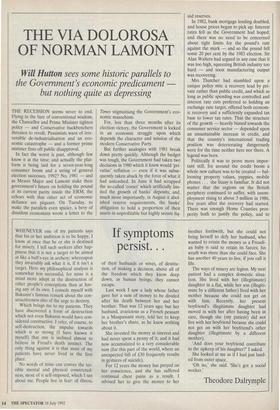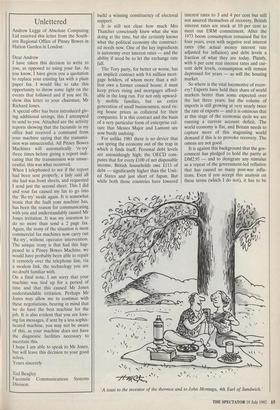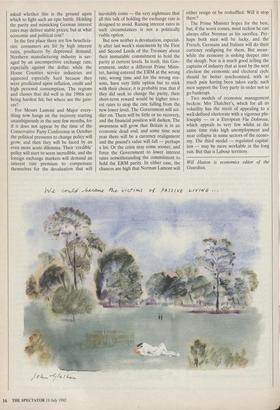THE VIA DOLOROSA OF NORMAN LAMONT
Will Hutton sees some historic parallels to
the Government's economic predicament — but nothing quite as depressing
THE RECESSION seems never to end. Flying in the face of conventional wisdom, the Chancellor and Prime Minister tighten policy — and Conservative backbenchers threaten to revolt. Pessimists warn of irre- versible de-industrialisation and an eco- nomic catastrophe — and a former prime minister fires off public disapproval.
In fact the worst is past, although few know it at the time; and actually the plat- form is being laid for a seven-year-long consumer boom and a string of general election successes. 1992? No, 1981 — and as Messrs Major and Lamont stake their government's future on holding the pound at its current parity inside the ERM, the echoes with that other act of economic defiance are piquant. On Tuesday, to make the parallels even spicier, a bevy of dissident economists wrote a letter to the
Times stigmatising the Government's eco- nomic masochism.
For, less than three months after its election victory, the Government is locked in an economic struggle upon which depends the character and mission of the modern Conservative Party.
But further analogies with 1981 break down pretty quickly. Although the budget was tough, the Government had taken two decisions in 1980 which it knew would 'pri- vatise' reflation — even if it was subse- quently taken aback by the force of what it had unleashed. In June it had scrapped the so-called 'corset' which artificially lim- ited the growth of banks' deposits; and, much more importantly, in August it abol- ished reserve requirements, the banks' obligation to hold a proportion of their assets in unprofitable but highly secure liq-
uid reserves.
In 1982, bank mortgage lending doubled, and house prices began to pick up. Interest rates fell as the Government had hoped; and there was no need to be concerned about tight limits for the pound's rate against the mark — and so the pound fell some 20 per cent by the 1983 election. Sir Alan Walters had argued in any case that it was too high, squeezing British industry too hard — and soon manufacturing output was recovering.
Mrs Thatcher had stumbled upon a unique policy mix: a recovery lead by pri- vate rather than public credit, and which as long as public spending was controlled and interest rate cuts preferred to holding an exchange rate target, offered both econom- ic recovery and a sufficiently expanded tax base to lower tax rates. That the structure of the growth — heavily biased towards the consumer service sector — depended upon an unsustainable increase in credit, and that the country's international trading position was deteriorating dangerously were for the time neither here nor there. A legend was born.
Politically it was to prove more impor- tant still, for around the credit boom a whole new culture was to be created — bal- looning property values, yuppies, mobile phones .. . the litany is familiar. It did not matter that the regions on the British periphery continued to suffer, with unem- ployment rising to above 3 million in 1986, five years after the recovery had started. There was enough Home Counties pros- perity both to justify the policy, and to
Unlettered
Andrew Legge of Absolute Computing Ltd received this letter from the South- ern Regional Office of Pitney Bowes in Hatton Garden in London: Dear Andrew I have taken this decision to write to you, as opposed to using your fax. As you know, I have given you a quotation to replace your existing fax with a plain paper fax. I would like to take this opportunity to throw some light on the events that followed and if you see fit, show this letter to your chairman, Mr Richard Jones.
A special offer has been introduced giv- ing additional savings, this I attempted to send to you. Attached are the activity reports showing that the facsimile in my office had received a command from your machine saying that the transmis- sion was unsuccessful. All Pitney Bowes Machines will automatically 're-try' three times before giving a report indi- cating that the transmission was unsuc- cessful, this was what occurred.
When I telephoned to see if the report had been sent properly, a lady said all she had was front sheets, and requested I send just the second sheet. This I did and your fax caused my fax to go into the 'Re-try' mode again. It is somewhat ironic that the fault your machine has, has been the reason for communicating with you and understandably caused Mr Jones irritation. It was my intention to do no more than send a 2 page fax. Again, the irony of the situation is most commercial fax machines now carry out 'Re-try', without operator intervention. The unique irony is that had this hap- pened to a Pitney Bowes Machine, we would have probably been able to repair it remotely over the telephone line, via a modem link, the technology you are no doubt familiar with.
On a final note, I am sorry that your machine was tied up for a period of time and that this caused Mr Jones understandable irritation. Perhaps Mr Jones may allow me to continue with these negotiations, bearing in mind that we do have the best machine for the job. It is also evident that you are loos- ing fax messages, if sent by a less sophis- ticated machine, you may not be aware of this, as your machine does not have the diagnostic facilities necessary to ascertain this.
I hope I am able to speak to Mr Jones, but will leave this decision to your good selves.
Yours sincerely Ted Beagley Facsimile Communications Systems Division. build a winning constituency of electoral support.
It is still not clear how much Mrs Thatcher consciously knew what she was doing at the time, but she certainly knows what the political economy she construct- ed needs now. One of the key ingredients is autonomy over interest rates — and the ability if need be to let the exchange rate fall.
The Tory party, for better or worse, has an implicit contract with 9.6 million mort- gage holders, of whom more than a mil- lion own a former council house; it must keep prices rising and mortgages afford- able in the long run. For not only upward- ly mobile families, but an entire generation of small businessmen, need ris- ing house prices as collateral for their companies. It is this contract and the basis of a very particular form of enterprise cul- ture that Messrs Major and Lamont are now busily undoing.
For unlike 1981 there is no device that can spring the economy out of the trap in which it finds itself. Personal debt levels are astonishingly high; the OECD com- putes that for every £100 of net disposable income, British households owe 1113 of debt — significantly higher than the Unit- ed States and just short of Japan. But while both those countries have lowered interest rates to 3 and 4 per cent but still not assured themselves of recovery, British interest rates are stuck at 10 per cent to meet our ERM commitment. After the 1973 boom consumption remained flat for four years, even with negative real interest rates (the actual money interest rate adjusted for inflation) and debt levels a fraction of what they are today. Plainly, with 6 per cent real interest rates and cur- rent debt levels, consumption will remain depressed for years — as will the housing market.
So where is the vital locomotive of recov- ery? Exports have held their share of world markets better than some expected over the last three years; but the volume of imports is still growing at very nearly twice the rate of exports — and it is ominous that at this stage of the economic cycle we are running a current account deficit. The world economy is flat, and Britain needs to capture more of this stagnating world demand if this is to provoke recovery. The omens are not good.
It is against this background that the gov- ernment has pledged to hold the parity at DM2.95 — and to denigrate any stimulus as a repeat of the government-led reflation that has caused so many post-war infla- tions. Even if you accept this analysis on these terms (which I do not), it has to be 'A toast to the inventor of the thermos and to John Montagu, 4th Earl of Sandwich.' asked whether this is the ground upon which to fight such an epic battle. Holding the parity and mimicking German interest rates may deliver stable prices; but at what economic and political cost?
In the first place there are few beneficia- ries: consumers are hit by high interest rates, producers by depressed demand. Northern manufacturing industry is sav- aged by an uncompetitive exchange rate, especially against the dollar; while the Home Counties service industries are squeezed especially hard because they were predicated upon inflation, credit and high personal consumption. The regions and classes that did well in the 1980s are being hardest hit; but where are the gain- ers?
For Messrs Lamont and Major every- thing now hangs on the recovery starting unambiguously in the next few months, for if it does not appear by the time of the Conservative Party Conference in October the political pressures to change policy will grow; and then they will be faced by an even more acute dilemma. Their 'credible' policy will start to seem incredible, and the foreign exchange markets will demand an interest rate premium to compensate themselves for the devaluation that will inevitably come — the very nightmare that all this talk of holding the exchange rate is designed to avoid. Raising interest rates in such circumstances is not a politically viable option.
But now neither is devaluation, especial- ly after last week's statements by the First and Second Lords of the Treasury about their immutable commitment to hold the parity at current 'levels. In truth, this Gov- ernment, under a different Prime Minis- ter, having entered the ERM at the wrong rate, wrong time and for the wrong rea- sons, have very little option but to stick with their choice; it is probably true that if they did seek to change the parity, their short-term reward would be higher inter- est rates to stop the rate falling from the new lower level. The Government will sol- dier on. There will be little or no recovery, and the financial position will darken. The awareness will grow that Britain is in an economic dead end, and some time next year there will be a currency realignment and the pound's value will fall — perhaps a lot. Or the crisis may come sooner, and force the Government to lower interest rates notwithstanding the commitment to hold the ERM parity. In either case, the chances are high that Norman Lamont will either resign or be reshuffled. Will it stop there?
The Prime Minister hopes for the best, but, if the worst comes, must reckon he can always offer Norman as his sacrifice. Per- haps both men will be lucky, and the French, Germans and Italians will do their currency realigning for them. But mean- while the economy is sinking deeper into the slough. Nor is it much good telling the captains of industry that at least by the next election the economic and electoral cycle should be better synchronised, with so much pain having been taken early; such men support the Tory party in order not to go bankrupt.
Two models of economic management beckon: Mrs Thatcher's, which for all its volatility has the merit of appealing to a well-defined electorate with a vigorous phi- losophy — or a European Via Dolorosa, which appeals to very few whilst at the same time risks high unemployment and near collapse in some sectors of the econo- my. The third model — regulated capital- ism — may be more workable in the long run. But that is Labour territory.
Will Hutton is economics editor of the Guardian.




















































 Previous page
Previous page